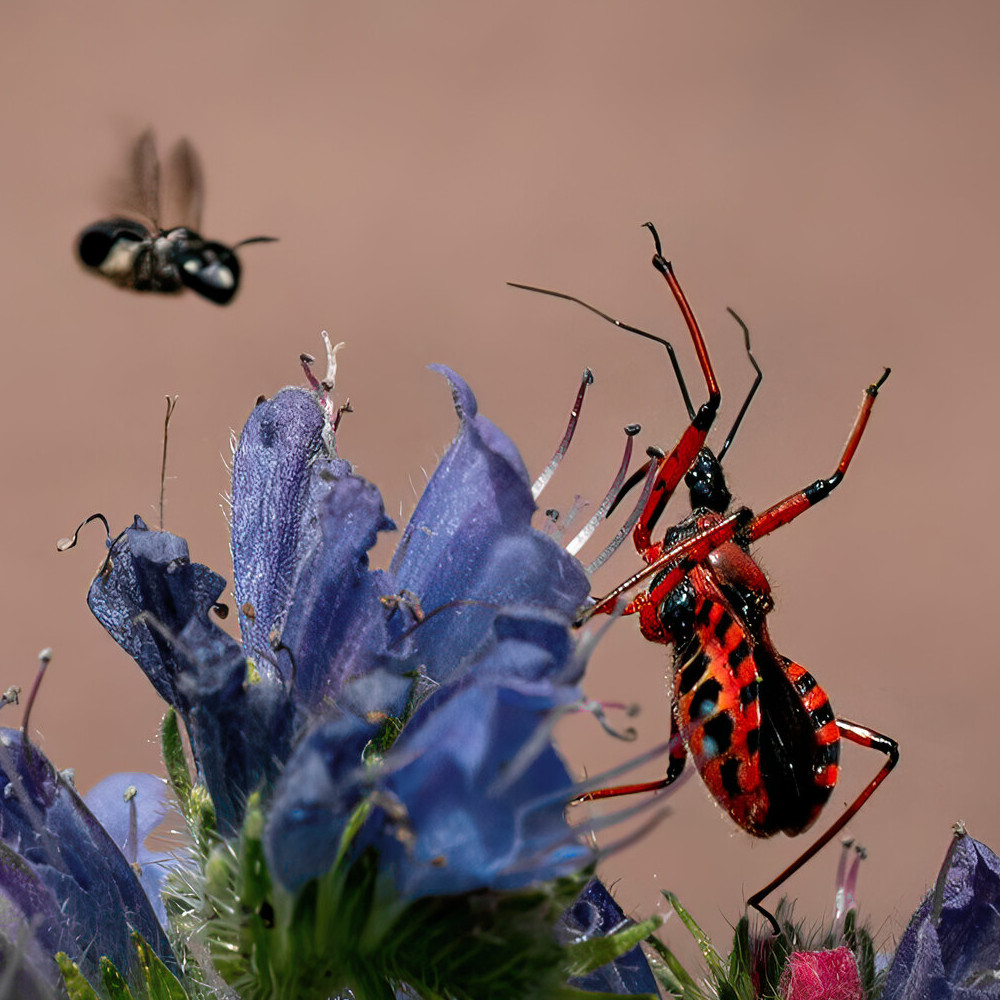Rhynocoris, an assassin with a
multitool
The story of a bug with a versatile venom.
You can listen to it over there
And find the other episodes on there, or on any podcast app:



This episodes uses the "European spring" soundscape, made from Naturalist recordings. You can find full details and other soundscapes on the dedicated page. This illustration is a photo taken by INaturalist user Rita Sunko
Transcript
Picture yourself walking in the grass, in the fresh air of the late
Spring.
[European spring soundscape fade in]
As the sun is shining on your rutilant body, you make your way
through this herbaceous jungle. You are a red assassin bug,
Rhynocoris iracundus, and you are looking for a prey. As a
proper assassin, you pack a sophisticated weapon, to attack your preys
and defend against your predators: your venom / a potent venom.
Hi and welcome to the Insect Insights, chill insect stories to relax
and wonder, available wherever podcasts are. If you like this podcast,
you can subscribe, leave a review and even an insect question. I am Max,
your host, and I hope you are ready to dive into insect knowledge for
another weekly insight!
While you are able to fly quite well to move fast, hunting is a task
done on legs rather than wings. You are parsing through the grassland,
searching for a prey to stalk. You are not a specialist, really,
anything you can get your legs on, you will try to stab with your
proboscis, the tubular mouthparts you use as both a stinger and a straw.
And you are more than ready for an insect smoothy.
It might be surprising for an outsider to see an ambush predator
styling your flashy colors. This red and black mix is clearly not for
camouflage. Maybe that is why one of your favourite preys are bees, who
are not too worried about bright colors, rather the opposite. You might
just appear to them as one more flashy spot on a flower. Your red
stripes come in really handy when it comes to warning your predators
about one thing: you are ready to fight back.
It is called aposematism, the practice to be very obvious, so that
potential predators easily learn not to choose you as a prey. Or else,
they will have to deal with the painful venom you inject with your bite.
When the colors aren’t sufficient, and you are faced with a foe, you
even raise your frontlegs and expose your proboscis, with a droplet of
poison dripping from it. This is the final, dramatic, warning.
Many would be the ones to envy the versatility of your venom. For
preys, it brings a quick paralysis, ensuring that you are safe around
them while you wait for their inside to be processed into a liquid meal.
For predators, it is extremely painful, and the paralysis can even kill
some of them by shutting down their body. Clearly, you make a worthy
opponent even for animals much bigger than you.
But it’s not only the bigger threats that you need to be worried
about. Diseases could also harm you. Once again, your incredible venom
protects you: when you slurp up insect juice, the antimicrobial
properties of your deadly weapon keep you healthy, in case you ended up
preying on a sick insect.
It is a powerful multitool you carry, and maybe your secret to be
such an assassin.
Sources
Rügen, N.; Jenkins, T. P.; Wielsch, N.; Vogel, H.; Hempel, B.-F.;
Süssmuth, R. D.; Ainsworth, S.; Cabezas-Cruz, A.; Vilcinskas, A.; Tonk,
M. Hexapod Assassins’ Potion: Venom Composition and Bioactivity from the
Eurasian Assassin Bug Rhynocoris Iracundus. Biomedicines
2021, 9 (7), 819. https://doi.org/10.3390/biomedicines9070819.
Ullah, M. I.; Altaf, N.; Afzal, M.; Arshad, M.; Mehmood, N.; Riaz,
M.; Majeed, S.; Ali, S.; Abdullah, A. Effects of Entomopathogenic Fungi
on the Biology of Spodoptera Litura (Lepidoptera: Noctuidae) and Its
Reduviid Predator, Rhynocoris Marginatus (Heteroptera: Reduviidae).
Int J�Insect�Sci 2019, 11,
1179543319867116. https://doi.org/10.1177/1179543319867116.



